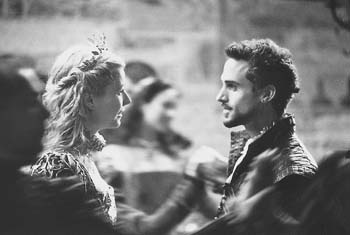![[Metroactive Movies]](/movies/gifs/movies468.gif)
[ Movies Index | Metro | Metroactive Central | Archives ]
Doublet Trouble
A Perfect Muse: Viola De Lesseps (Gwyneth Paltrow) inspires William Shakespeare (Joseph Fiennes) to pen his most famous romance.
'Shakespeare in Love' has fun with Will's bard times
GWYNETH PALTROW, big of eyes and long of neck, is hard to take playing Englishwomen. Her chiseled syllables are like the measured utterances of a fresh Royal Academy of Dramatic Arts grad. (The old joke is that RADA stands for "Really awful, darling.") "I will have poetry in my life," she says in Shakespeare in Love, and it is to groan--you imagine what sort of poetry would intoxicate Paltrow's high-minded English girl of 1593, the heiress Viola De Lesseps (maybe A Knight With Armor?).
In this ever-darkening comedy, Paltrow plays a would-be actress who ends up as the star of the world premiere of Romeo and Juliet. Here, Paltrow's cautiousness and rigidity work. It's the old transformative power of Shakespeare. This actress, whom I usually regard as kind of a pest, had me weeping.
Shakespeare in Love begins as Richard Lesterstyle historical debunkery, complete with comic torture scenes. We first see a moneylender (Tom Wilkinson) roasting the feet of the hapless owner of the Rose Theater, Henslowe (Geoffrey Rush). Plague has closed the theaters again, Henslowe is broke and his usual mortgage-lifter playwright, William Shakespeare (Joseph Fiennes), is creatively blocked.
Fiennes' scroungy Shakespeare is ink-stained and impotent, wretched at a desk crowded with parchment and his "A present from Stratford-upon-Avon" coffee mug. Inspiration comes when, at first sight, he falls in love with Viola.
Viola is a well-bred, stage-struck young lady who loves the theater, but who is, sadly, an heiress on the verge of marrying a fortune-hunting earl. In the best Shakespearean style, Viola disguises herself as a boy and joins the cast of Shakespeare's latest opus, Romeo and Ethel, the Pirate's Daughter.
What starts as parodistic farce sneaks up on the viewer. In the wings, there's hope for a rex ex machina in the form of Judi Dench's Elizabeth the First. Dench embodies the style of Shakespeare in Love. At first, she's gusty and low comedic, braying in laughter at a performing circus dog, parceling out Marc Norman and Tom Stoppard's gags. (Her Majesty, after being addressed by an annoying noble, intones, "Have a care when you use my name. You might wear it out.") Later, this imperial actress embodies the threat of death, the iron in the comedy.
As impressive as the production is in the recent Elizabeth, Shakespeare in Love is even more overwhelming. This Elizabethean London seems to go on into infinity. But Shakespeare in Love stays intimate, even in its tumult of trouble and clowning. The distracted, helpless playwright is fortune's fool, but his language doesn't fail him.
The film comes to a fine, piercing point at the premiere of Romeo and Juliet, where the lovers Will and Viola speak lines wrung out of their own hopeless romance. Then the joking is over, except for a few last stings by Dench's Elizabeth. Finally, Shakespeare in Love endorses the view of Shakespeare that scholar Harold Bloom is promoting in Shakespeare: The Invention of the Human--that the bard was the bridge between the middle ages and our age of reason and freedom (such as it is). In this irresistible film, he evolves from comic hack to deathless hero.
[ San Jose | Metroactive Central | Archives ]
![]()

Laurie Sparham
Shakespeare in Love (R; 113 min.), directed by John Madden, written by Marc Norman and Tom Stoppard, photographed by Richard Greatrex and starring Gwyneth Paltrow and Joseph Fiennes, opens Friday at Camera One in San Jose and the Palo Alto Square.
From the December 24-30, 1998 issue of Metro.